Repair (Café) workshops in a Repair Country : Part 2
– by Himadri Das and Purna Sarkar
Please refer to Part 1 for the first part of this blog post.
Salvaging parts for the sake of frugality or urban mining but not necessarily for the sake of circular economy.
Salvaging parts depends on many factors. For example, the type of market in which the repairer sits is a major influencer. If it’s an old market or a relatively new market which was established in the last 30 years. The factors are a type of customers, the generation of repairers, and the availability of spares, and so on. For example, umbrella repairs are one of the rare sights even in some of the old markets. The parts for umbrellas are mostly salvaged from other broken old umbrellas. The spares are only available through urban mining as they are simply not manufactured anymore. The repairers tie-up with local recyclers referred to as bhangarwala/ Kabadiwalas.
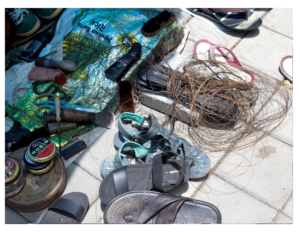
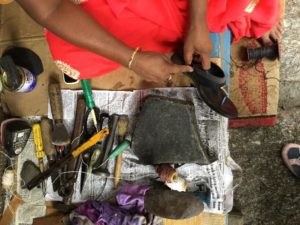
When the spares are available, salvaging parts is not preferred though it’s a traditional practice for many types of repairs like repair of zips or buttons in clothes or bags. Customers prefer to have new spares in their repaired articles. Sometimes a range of spares is available in varied quality and price.
Repairing or replacing whatever helps to maintain things.
Repairers have become Replacers because all spares are available in the market.
In an electrical repair shop, spares are sourced from local suppliers and Chinese ones are avoided, given the efforts to minimize Chinese market influx. Many customers prefer to buy refurbished products rather than repair. About 30%-40% of earnings come from selling refurbished goods. For example, customers may prefer to buy a new motor based on the cost of rewinding an old one. The charge for the repair services depends upon the customer’s preferences. In the Repair Cafe workshops, attempts were made to repair old motors which needed rewinding. This activity is highly time-consuming and needs a high level of skill. A professional repairer’s economy based on effort made in terms of time required weighed against the payments received makes such repairs redundant for the professional repairer, the fixed rate strategy does not work. A wide range of spares found in an electrical repair shop would be mixer spares like blade, coupler; cooker spares like gasket; motor spares like armature, motor, fan, switch, holders, MCB, bush (carbon), aluminum base, plastic, and metal base for mixer grinder, mixer cup, etc.
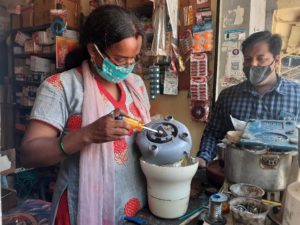
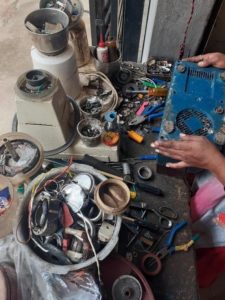
Repair Cafe workshops work closer to people
This was an important issue to address in the Repair Cafe Workshops. In the Indian cities repair is always down the street or around the corner. So for Repair workshops to be successful they have to go closer to the people.
At Repair Cafe Bengaluru, we tried many possibilities. One was reaching out to resident welfare associations or representations of communities in order to organize Repair Cafes. The workshops were held during the weekends so all could participate. All would include the participants (from the community), the tinkerers (who held regular jobs during the week), and the professional repairers. Once set up the Repair Cafe team would go knocking on doors of apartments to draw out participants. The fact that repair was so close to hand was taken as an opportunity by many.
Mr. Hansraj an elderly gentleman walked in with his steam vaporizers at Ranka Plaza Apartments workshop and kept on insisting to have a look. Venkat and Nerris our repair mentors were confused and wondering, what is there in a steamer to repair? The Weather conditions in Bengaluru are quite wet, windy and the atmosphere is full of pollen. Therefore cold, cough, etc. is quite a common occurrence, and that why there is high usage of steam vaporizers in every household. Mr. Hansraj said that none of the repairers are willing to repair it. He wanted to repair them for ready use. On his insistence, the steamers were opened and the jar was cleaned from inside. The wire strip was scrubbed and it started throwing out the steam again. Mr. Hansraj gave us a big smile of satisfaction and left the workshop murmuring absent-mindedly to himself without offering any donations.
The issue was however that moving from community to community was not giving the sense of regularity where someone could plan to come back again with other things to repair. The one-of workshop was not sufficient to trigger a change of practice among communities. We tried to centralize it in the basement of a charitable hospital in the center of town. Though interested participants did make their way from far away and it was much easier to organize from a logistics point of view, the number of participants fell.
Next we tried to organize quick turnaround workshops like cycle repairs and we also partnered with a city-based initiative by a government body for the promotion of soft mobility. The events were called ‘cycle days’ and they were a success as ‘Repair Cafe’ would simply roll out at ‘Cycle Days’ and help fix the cycles that needed fixing.
The Repair Café platform at Cycle Day was quite popular amongst children. Many would come from humble backgrounds and got their second-hand cycle which requires lots of repairs. Children would spend hours repairing their cycle tires with lots of puncture holes. The children would use the repaired cycles carrying grain sacks and delivering newspapers. Cycle repair workshops at all locations were received very enthusiastically by all.
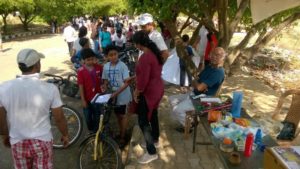

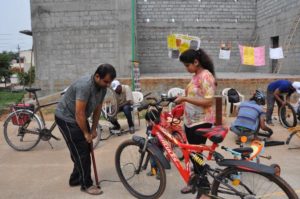
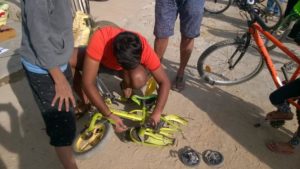
Online workshops helped reach out to people in different cities, they were received very well. Many years of organizing repair café workshops, training programs helped us to curate online workshops. We were surprised by the huge response. People were very comfortable joining online programs more so than offline. Even the regular followers of Repair Café Bengaluru came forward to volunteer as online mentors.
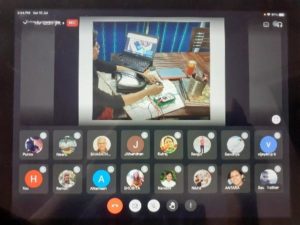

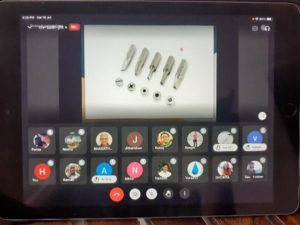
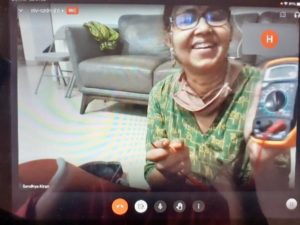
Organizing Repair café was just the beginning for us, we didn’t know that when we started. We learned the virtue of repair is not lost in Indian households which we didn’t know either. Organizing Repair Cafes has raised many more intriguing questions:
- What is ustad-shagird (mentor- intern relationship) system of education?
- Many children drop out of school to join such informal repair professions. How do they learn the trade?
- Is replacing also repairing? Does large-scale production of spares by micro, small and medium scale (MSME) industries have a role to play in this?
- Is repair culture more vibrant in industrial towns?
- Does the Repair trade remain a family business in India and why so?